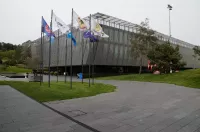England, a constituent country of the United Kingdom, occupies roughly 62% of Great Britain and includes over 100 smaller islands. Bordered by Scotland to the north, Wales to the west, and surrounded by seas, it's closely situated to continental Europe and Ireland. The 2021 census recorded England's population at 56,490,048, with London serving as both the capital and largest city.
1900: National Gallery Showcases Art Through the Centuries
By 1900, the National Gallery in Trafalgar Square had amassed an impressive collection of over 2,300 paintings, spanning from the mid-13th century to 1900, showcasing a rich tapestry of art history.
1912: Birmingham Triennial Music Festival Concludes After a Historic Run
The Birmingham Triennial Music Festival, the longest-running classical music festival of its kind, came to an end in 1912, marking the conclusion of a significant era in England's musical landscape.
1922: BBC Founded
The British Broadcasting Corporation (BBC) was founded in 1922 as a public broadcasting corporation.
1926: Alfred Hitchcock's "The Lodger: A Story of the London Fog" Sets New Standard for Thrillers
Alfred Hitchcock's film "The Lodger: A Story of the London Fog," released in 1926, significantly influenced the thriller genre, establishing Hitchcock as a master of suspense.
1929: "Blackmail" Breaks New Ground as Britain's First Sound Feature Film
Alfred Hitchcock's "Blackmail," released in 1929, is widely regarded as Britain's first sound feature film, marking a pivotal moment in the history of British cinema.
1935: London Symphony Orchestra Makes its Mark in Film Music
The London Symphony Orchestra, renowned for its recordings of film scores, first ventured into the world of film music in 1935.
1946: Nationalization of the Bank of England
Established in 1694 as a private entity, the Bank of England was nationalized in 1946, becoming a state-owned institution and the central bank of the United Kingdom.
1946: Enactment of National Health Service Act
The National Health Service Act of 1946 laid the groundwork for the establishment of the NHS.
July 1948: Launch of the National Health Service (NHS)
The National Health Service (NHS) was inaugurated in July 1948, implementing the provisions outlined in the National Health Service Act of 1946, based on the recommendations of the Beveridge Report.
1948: Establishment of the National Health Service
In 1948, the National Health Service (NHS) was created, providing publicly funded healthcare to all permanent residents in England free at the point of need.
1950: First Formula One World Championship Race at Silverstone
The 1950 British Grand Prix at Silverstone marked a significant milestone as the first race in the newly established Formula One World Championship.
1965: Abolition of Civil Parishes in Greater London
The year 1965 marked a significant change in the administrative structure of Greater London with the abolition of civil parishes.
1966: England Wins the FIFA World Cup
England hosted and won the FIFA World Cup in 1966. The final game was the most watched television event in the UK.
1971: Introduction of Bus Rapid Transit
The world's first Bus Rapid Transit system was launched in England in 1971 with the opening of the Runcorn Busway.
1974: Implementation of Two-Tier County System
In 1974, a two-tier system of county administration was implemented throughout all ceremonial counties in England.
1974: Reform of Ceremonial Counties
In 1974, the structure of ceremonial counties in England underwent a significant reform, altering their number and organization. This was part of a broader process of local government reform.
1979: "Monty Python's Life of Brian" Achieves Cult Status in British Comedy
Released in 1979, "Monty Python's Life of Brian" went on to become a cult classic, frequently voted as one of the funniest films of all time by the UK public.
1981: Start of Crime Increase
The period between 1981 and 1995 saw a notable increase in crime rates in England.
January 1982: Record Low Temperature
England experienced its lowest recorded temperature, −26.1 °C (−15.0 °F), in January 1982 at Edgmond, Shropshire.
1991: Regional Life Expectancy Trends in England
Between 1991-1993 and 2012-2014, a notable trend emerged in England's life expectancy, with the North East experiencing a 6.0-year increase and the North West a 5.8-year increase, indicating a gradual narrowing of regional disparities.
1991: Impact of Immigration on England's Population
Immigration accounted for roughly half of the population growth observed in England between 1991 and 2001.
1993: Regional Life Expectancy Trends in England
Between 1991-1993 and 2012-2014, a notable trend emerged in England's life expectancy, with the North East experiencing a 6.0-year increase and the North West a 5.8-year increase, indicating a gradual narrowing of regional disparities.
1994: Introduction of Regional Divisions
Beginning in 1994, England was divided into regions for specific administrative and political purposes.
1995: Peak of Crime Rates and Start of Decline
Crime in England peaked in 1995. Following this year, a significant decline in crime rates was observed, with a 42% drop between 1995 and 2006.
1995: Establishment of the Environment Agency
The Environment Agency, a non-departmental public body, was established in 1995. It is sponsored by the Department for Environment, Food and Rural Affairs and is tasked with protecting and enhancing the environment in England.
1996: Final Reform of Ceremonial Counties
Further reforms in 1996 brought the number of ceremonial counties in England to their current total. This marked the culmination of a series of changes that began in 1974, aiming to modernize and streamline local administration.
1996: Separation of Ceremonial and Administrative Counties
The 1996 local government reform in England brought about a key change: the separation of ceremonial counties from administrative counties. This aimed to create clearer distinctions between the historical and geographical significance of ceremonial counties and the practical administration of local government.
1997: Growth of Creative Industries
Beginning in 1997, the creative industries in England experienced an average annual growth of 6% until 2005, by which time they accounted for 7% of the GVA.
1998: London Region Referendum
A referendum held in the London Region in 1998 paved the way for the creation of the London Assembly, reflecting a move toward greater regional autonomy in the capital.
2001: Impact of Immigration on England's Population
Immigration accounted for roughly half of the population growth observed in England between 1991 and 2001.
2001: UK Film Council Recognizes Top English Directors
In 2001, the UK Film Council identified David Yates, Christopher Nolan, Mike Newell, Ridley Scott, and Paul Greengrass as the five most commercially successful English film directors since 2001, highlighting their impact on the film industry.
2001: 2001 Census: Religious Landscape of England
In 2001, the census in England revealed that 14.6% of the population declared no religious affiliation. This data point serves as a reference point to compare with the 2011 census, showing the increase in secularization.
2002: Land of Hope and Glory at the Commonwealth Games
"Land of Hope and Glory" was used to represent England at the 2002 Commonwealth Games, reflecting its status as one of the country's unofficial anthems.
2004: North East England Devolution Referendum
A referendum on devolution for the North East region of England was held in 2004. The proposal was rejected, preventing the establishment of a regional assembly.
2004: Failed North East England Devolution Referendum and Abolition of Regional Structure
The unsuccessful 2004 devolution referendum in North East England led to the cancellation of plans for further regional assemblies and the eventual dismantling of the regional structure outside London.
2005: Economic Shift in England
In 2005, the creative industries in England contributed to 7% of the Gross Value Added (GVA) and experienced an average annual growth of 6% between 1997 and 2005.
2006: End of Crime Rate Decline
By 2006, the crime rate in England had fallen by 42% from its peak in 1995. However, this decrease coincided with a doubling of the prison population, resulting in a high incarceration rate in Western Europe.
2007: Foreign Language Speakers in English Schools
In 2007, approximately 800,000 students in English schools reported speaking a foreign language at home, with Punjabi and Urdu being the most prevalent.
2007: Foreign Language Education in England
In 2007, there were reports of around 800,000 school students in England who could speak a foreign language at home, with Punjabi and Urdu being the most common, highlighting the multilingual landscape of the country.
2007: Legislation for Civil Parish Recreation
New legislation enacted in 2007 provided a pathway for the recreation of civil parishes in England, including Greater London. This offered communities the opportunity to re-establish these local governance structures after a period of absence.
2008: Department of Health Expenditure on the NHS
In the fiscal year 2008-2009, the Department of Health allocated a substantial £98.6 billion to fund the NHS, reflecting the significant financial commitment to public healthcare.
2008: Enactment of the Climate Change Act
The Climate Change Act, passed by the UK Parliament in 2008, established legally binding emission reduction targets for the country, marking the world's first such national commitment to climate change mitigation.
2008: England National Rugby League Team
The England national rugby league team became a full test nation in 2008, succeeding the Great Britain national rugby league team.
2009: Department of Health Expenditure on the NHS
In the fiscal year 2008-2009, the Department of Health allocated a substantial £98.6 billion to fund the NHS, reflecting the significant financial commitment to public healthcare.
2009: Creation of the Supreme Court of the United Kingdom
The Supreme Court of the United Kingdom, the highest court for criminal and civil cases in England and Wales, was established in 2009. It assumed the judicial functions previously held by the House of Lords.
2009: Discovery of the Staffordshire Hoard Reveals Anglo-Saxon Artistry
The unearthing of the Staffordshire Hoard in 2009 provided significant insights into Anglo-Saxon craftsmanship, showcasing intricate designs and the fusion of Gaelic and Anglian artistic styles.
2010: London Business School's MBA Program Earns Top Ranking
The Financial Times recognized the London Business School's MBA program as the best in the world in 2010, solidifying its reputation as one of the world's leading business institutions.
2011: English Language Proficiency in England
According to the 2011 census, a significant majority of 98% of the population in England reported speaking English well or very well.
2011: England Boasts Over 1,600 Museums
As of 2011, England was home to over 1,600 museums, offering a diverse range of cultural and historical experiences to visitors.
2011: Census Data on Languages Spoken in England
Data from the 2011 census conducted by the Office for National Statistics revealed that Polish had become the most spoken language in England after English.
2011: Andy Serkis Establishes The Imaginarium Studios in London
Renowned for his motion capture work, actor Andy Serkis founded The Imaginarium Studios in London in 2011, further cementing London's status as a hub for film innovation.
2011: 2011 Census: Rise of Non-Religious Population in England
The 2011 census in England indicated that 24.7% of the population declared no religious affiliation, a significant increase from the 14.6% reported in the 2001 census. This data point underscores a growing trend of secularization in England during this period.
2011: 2011 Census: Religious Beliefs in England
The 2011 census in England revealed that 59.4% of the population identified as Christian, while 24.7% reported having no religious affiliation. This census highlighted the changing religious landscape of England in 2011.
2012: Regional Life Expectancy Trends in England
Between 1991-1993 and 2012-2014, a notable trend emerged in England's life expectancy, with the North East experiencing a 6.0-year increase and the North West a 5.8-year increase, indicating a gradual narrowing of regional disparities.
2014: Status of Civil Parishes in Greater London
As of 2014, only one civil parish, Queen's Park, remained in Greater London. This followed a period of abolition starting in 1965, with legislation in 2007 allowing for their potential recreation.
2014: Regional Life Expectancy Trends in England
Between 1991-1993 and 2012-2014, a notable trend emerged in England's life expectancy, with the North East experiencing a 6.0-year increase and the North West a 5.8-year increase, indicating a gradual narrowing of regional disparities.
2014: London's Status as a Global Financial Center
By 2014, London solidified its position as the largest financial hub in Europe and the second largest globally, underscoring its significant role in international finance.
2014: Recognition of Cornish People as National Minority
In a significant development in 2014, the UK government formally recognized the Cornish people as an indigenous national minority under the Framework Convention for the Protection of National Minorities.
2019: England Wins Cricket World Cup
England achieved a historic victory in the 2019 Cricket World Cup, becoming the first country to secure World Cup titles in football, rugby union, and cricket.
2021: Population of London
As of 2021, London's metropolitan area had a population of 14.2 million, making it the largest metropolitan area in the United Kingdom.
2021: 2021 Census
In 2021, the population of England was recorded as 56,490,048.
July 2022: Record High Temperature
The highest temperature ever recorded in England was 40.3 °C (104.5 °F), measured in July 2022 at Coningsby, Lincolnshire.
September 2022: Prison Population Statistics
As of September 2022, His Majesty's Prison Service, which reports to the Ministry of Justice, managed most prisons in England and Wales, housing a total of 81,309 prisoners.
2022: Official Language Status for British Sign Language
A pivotal moment in linguistic recognition arrived in 2022 when British Sign Language (BSL) was officially recognized as a language of England through the enactment of the British Sign Language Act 2022.
2022: Opening of Crossrail Project
Europe's largest construction endeavor, Crossrail, opened in 2022, having incurred a projected cost of £15 billion.
2022: GDP per Capita
In 2022, England's GDP per capita reached an average of £37,852, reflecting a strong economic performance.
2022: Scientific Research Output in the UK
In 2022, the UK, including England, produced 6.3% of global scientific research publications and garnered a 10.5% share of scientific citations, ranking third globally after the United States and China.
2022: UK's Ranking in Environmental Performance Index
In 2022, the United Kingdom achieved a commendable second-place ranking out of 180 countries assessed by the Environmental Performance Index.
2022: Wind Power Contribution to UK Electricity
In 2022, wind power emerged as the UK's fastest-growing energy source, contributing to 26.8% of the nation's electricity generation.
2024: Establishment of Great British Railways
Great British Railways, a state-owned entity, is planned to commence overseeing rail transport in Great Britain starting in 2024.
2024: Global University Rankings Highlight England's Academic Excellence
In 2024, four prestigious universities in England: the University of Cambridge, University of Oxford, Imperial College London, and University College London secured positions among the top ten in the QS World University Rankings. This achievement underscores England's standing as a global leader in higher education.
2050: UK's Net Zero Emissions Target
The UK has legally committed to achieving net zero greenhouse gas emissions by 2050, aiming to mitigate its environmental impact.
Mentioned in this timeline
China officially the People's Republic of China is an East...

Football is a family of team sports primarily involving kicking...

FIFA the F d ration Internationale de Football Association is...
France officially the French Republic is primarily located in Western...

The ICC Men's Cricket World Cup is a quadrennial international...

Music is a cultural universal involving the arrangement of sound...
Trending

25 minutes ago Sean Payton to relinquish play-calling duties to Davis Webb in 2026.

26 minutes ago Taylor Decker Announces Return to Lions for 2026 Season, Future Plans
1 hour ago Axon Enterprise Stock Surges on Positive Q4 Results and Analyst Recommendations.
1 hour ago Team USA Men's Hockey triumph: Hughes' golden goal and revisited Olympic dreams.

1 day ago Candace Owens embroiled in Erika Kirk cheating rumors and pastor trafficking claims.

2 hours ago Martin Short's daughter, Katherine Short, tragically passes away at the age of 42.
Popular

Jesse Jackson is an American civil rights activist politician and...

Susan Rice is an American diplomat and public official prominent...

Barack Obama the th U S President - was the...

Michael Joseph Jackson the King of Pop was a highly...

Bernie Sanders is a prominent American politician currently serving as...

XXXTentacion born Jahseh Dwayne Ricardo Onfroy was a controversial yet...